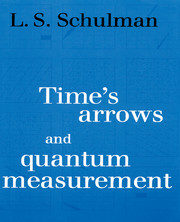Book contents
- Frontmatter
- Contents
- Preface
- 1 Introduction
- 2 Irreversibility
- 3 Arrows of time
- 4 Correlating arrows of time
- 5 Two-time boundary value problems
- 6 Quantum measurements: cats, clouds and everything else
- 7 Existence of special states
- 8 Selection of special states
- 9 Abundance of special states
- 10 Experimental tests
- 11 Conclusions and outlook
- Author index
- Index
2 - Irreversibility
Published online by Cambridge University Press: 05 August 2012
- Frontmatter
- Contents
- Preface
- 1 Introduction
- 2 Irreversibility
- 3 Arrows of time
- 4 Correlating arrows of time
- 5 Two-time boundary value problems
- 6 Quantum measurements: cats, clouds and everything else
- 7 Existence of special states
- 8 Selection of special states
- 9 Abundance of special states
- 10 Experimental tests
- 11 Conclusions and outlook
- Author index
- Index
Summary
Things happen. That may seem obvious, but it has also been maintained that all the ‘happening’ does not signify change and that the way of the world is periodic and repetitious:
One generation passeth away, and another generation cometh…
The sun… riseth, and the sun goeth down,
And there is nothing new under the sun.
—Ecclesiastes, Chapter 1I won't discuss the profound aspects of this passage, but I will do post-industrial age nitpicking. Only in the past century has humanity understood a distinction that exists among these cyclic behaviors. For the 'rising and setting of the sun, there is indeed little that is happening. To a good approximation this is non-dissipative. But as to the coming and going of generations, with the benefit of wisdom gained in building steam engines, we recognize that birth and death can occur only so long as there is a source of negative entropy.
I could continue in this vein and discuss how the failure to distinguish between free and frictional motion confused humanity's greatest minds as they grappled with elementary mechanics. But I wish to begin a technical discussion of irreversibility and only want to draw a lesson of humility from the historical perspective. Until the past few centuries, humanity failed to appreciate the most manifest of time's arrows, the second law of thermodynamics. Unless one realizes that Nature's dynamics are mostly time symmetric one does not know that there is a problem.
- Type
- Chapter
- Information
- Time's Arrows and Quantum Measurement , pp. 17 - 80Publisher: Cambridge University PressPrint publication year: 1997



